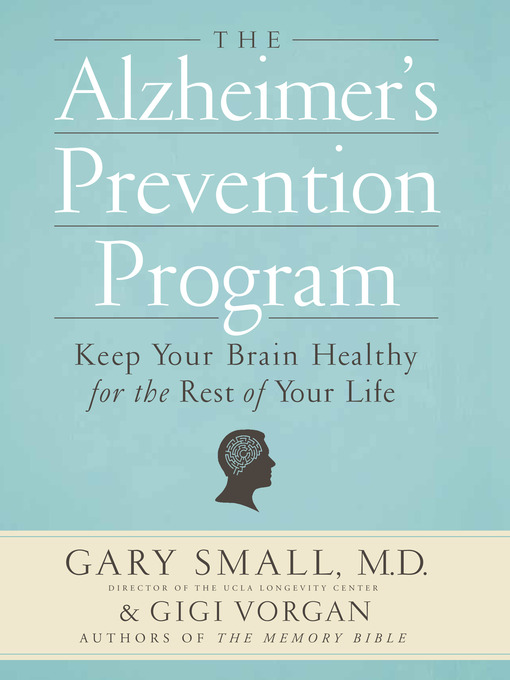
The Alzheimer's Prevention Program
Keep Your Brain Healthy for the Rest of Your Life
فرمت کتاب
ebook
تاریخ انتشار
2011
نویسنده
Morley Saferنویسنده
Hilary Pymنویسنده
Morley Saferنویسنده
Hilary Pymنویسنده
Gigi Vorganشابک
9780761168737
کتاب های مرتبط
- اطلاعات
- نقد و بررسی
- دیدگاه کاربران
نقد و بررسی

November 21, 2011
Director of the UCLA Longevity Center, Small and partner Vorgan (The Memory Prescription) have refined their program into a seven-day kick-start to master such frustrating memory problems as “tip-of-the-tongue” phenomena and forgetting names, while developing healthy habits that could delay or prevent the onset of Alzheimer’s and other forms of dementia. Their regime includes a diet that fights inflammation and is rich in antioxidants, omega-3 fatty acids, and brain-building proteins and carbs; stress relief (e.g., meditation, plentiful sleep, setting realistic goals); moderate physical exercise (walking, strength training, dancing, and even shopping); and daily mental challenges to practice focus and concentration. In sidebar q&as, the authors dispel or confirm current beliefs about memory loss; for example, the dangers of aluminum exposure and cellphones. They also provide quizzes to determine readers’ physical, mental, and stress profiles. The star performers are entertaining brain games and mood-lifting strategies aimed at decreasing harmful stress hormones. The simple dietary and fitness recommendations are small steps with potentially high returns for long-term brain health. A brief section on health care, supplements, and drugs that can help or harm the brain will assist those considering medical treatment.

November 1, 2011
Small (Director/UCLA Longevity Center and freelance writer Vorgan (co-authors: The Naked Lady Who Stood on Her Head, 2010, etc.) introduce elements of a program to optimize brain health. The authors begin with a general introduction to our current understanding of Alzheimer's, including the possible roles played by amyloid plaques (waxy protein fragments) and tau tangles (twisted fibers), as well as other proteins, inflammation and oxidation. Though much of Alzheimer's is an uncharted landscape, it does appear that genetic considerations play a role only one-third of the time, leaving two-thirds to nongenetic factors. Thus enters the authors' plan to maintain a healthy brain as a preventative measure (and not only for Alzheimer's but other dementias). In a clear, prudent voice, Small and Vorgan present the components of their program--"Physical exercise, a nutritious diet, mental stimulation, and stress reduction have their greatest impact when people combine these strategies and continue them for several years"--and delve deeply into each one, tendering anecdotal evidence and the results from experimental studies. They proceed with self-assessment questionnaires of both subjective and objective perspectives and give concrete advice--brain teasers, exercise programs, memory-strengthening skills, nutritional guidelines--on how to build the components into your life. Finally, they offer a step-by-step, seven-day regimen during which, they suggest, "you will begin to notice changes." The program blends action with moderation, and the authors note that you tinker with the program--a helpful note especially in relation to the food recommendations, which are lackluster at best. A commonsensical guide to help keep your brain in fighting trim.
(COPYRIGHT (2011) KIRKUS REVIEWS/NIELSEN BUSINESS MEDIA, INC. ALL RIGHTS RESERVED.)

December 1, 2011
Although there are no scientifically proven preventive measures for Alzheimer's disease or dementia, both conditions are a growing problem among the elderly and an increasing concern among those soon to become elderly. Here, Small (psychiatry, Univ. of California, Los Angeles; director, UCLA Longevity Ctr.) and his wife, Vorgan, expand some of the memory skills and mental workouts Small first presented in The Memory Bible and include further research and anecdotal evidence about how to protect the brain with physical exercise, healthy nutrition, and specific vitamins and minerals; to strengthen memory skills; and to reduce stress to slow down--or even prevent--the onset of Alzheimer's disease. A clear and helpful seven-day start-up program for Alzheimer's disease prevention is included. VERDICT Other titles cover this timely and important topic, but readers will appreciate the authors' practical and upbeat advice; this book will make readers feel that they can do something to protect themselves from this devastating disease.--Marcia Welsh, Dartmouth Coll. Lib., Hanover, NH
Copyright 2011 Library Journal, LLC Used with permission.

December 1, 2011
Our memories make us who we are. Alzheimer's disease washes them away. Although genetics are partly to blame for Alzheimer's, the way we live contributes to the risk. Small, professor of psychiatry and director of the Longevity Center at UCLA, has fashioned a sort of mind manual that outlines lifestyle changes and strategies that might delay symptoms of the disease. His recommendations focus on exercise (physical fitness and memory training), sound sleep, stress reduction, and proper nutrition. Even moderate exercise (walking) boosts brain health. Small and Vorgan describe techniques that strengthen memory. Their Alzheimer Prevention Diet ramps up the intake of foods with high levels of antioxidants and omega-3 fatty acids. Some of the iffier issues related to postponing the disease are addressed, such as use of common anti-inflammatory medications, vitamins, supplements, and even prescription medicines (statins and cholinergic drugs). A detailed to-do list for the first week of the prevention program is included. Because the tau tangles and amyloid plaques that characterize Alzheimer's begin accruing in young adulthood, it's never too soon to safeguard the brain.(Reprinted with permission of Booklist, copyright 2011, American Library Association.)

























دیدگاه کاربران